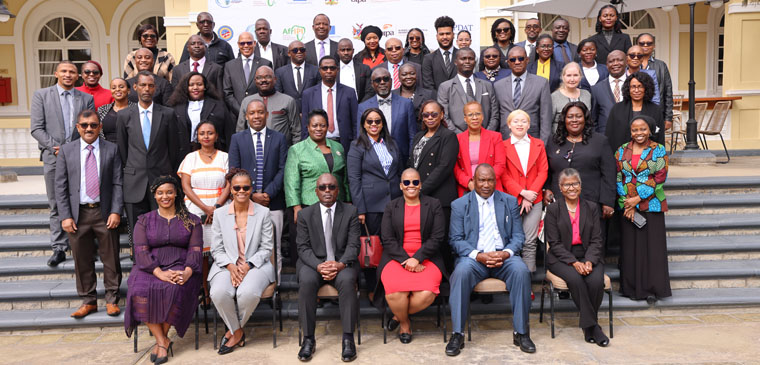The African Regional Intellectual Property Organization (ARIPO) hosted a Judges’ Colloquium on Enforcement of Intellectual Property Rights in Africa in partnership with the Intellectual Property Rights and Innovation in Africa (AfrIPI) the Government of the Republic of Namibia, represented by the Business Intellectual Property Authority (BIPA) and the United States Department of Justice (USDOJ). The three-day Colloquiumwas held from the 3rd to the 5th of May 2023 at the Swakopmund Hotel & Entertainment Centre in Swakopmund, Namibia.
In continuance of shaping the IP Landscape in Africa, ARIPO places importance on the work of the Judiciary System, which is a key resource that assists with the enforcement of laws. In that regard, work has been in progress to capacitate legal practitioners with relevant IP knowledge and facilitate the awareness of current adjudication trends across geographies.
Speaking during the official opening ceremony, the ARIPO Director General, Mr. Bemanya Twebaze, articulated the need to “establish a network of judges who can exchange knowledge and information on IP rights and help populate a Compendium of Africa’s IP rights Case Law from respective jurisdictions.”
Celebrating the advent of the African Continental Free Trade Area (AfCFTA), Director General Bemanya Twebaze indicated that following the current trajectory, estimates show that intra-Africa trade will exceed the 50th percentile. “Inevitably, this good development will come with its own IP enforcement requirements because, as FTA tears down the borders, IP remains territorial. To that effect, this colloquium couldn’t be timelier and future-oriented to deal with the envisaged issues.”
He added that the past and current experiences of the judges mattered as they would guide the creation of future IP adjudication strategies that are more informed with wisdom from multiple jurisdictions. “The compendium will facilitate the continuous exchange of knowledge on IP. As such, the colloquium will build upon what the Honourable Judicial Officers have already acquired through their cumulative experiences”, said the Director General.
Namibia’s Minister of Justice, Honourable Yvonne Dausab, was the guest of honour at the Judges Colloquium. She spoke highly of ARIPO’s work and the need for all stakeholders to participate and support the work of developing a steadfast regional IP system.
In her remarks, Honourable Dausab said that “The Colloquium, undoubtedly, serves as an important platform for sharing experiences and knowledge on intellectual property rights and the role of the courts in Africa. This event is a testament to our collective commitment to promote and protect intellectual property rights in Africa.”
She also addressed trade-related matters citing that “It is common cause that strong IP protections not only protect the creators of IP but also enable businesses to leverage their IP assets, which can lead to job creation, foreign investment, and overall economic growth.”
Some of the officials from the Namibian Government who were present at the opening ceremony, include the Governor of the Erongo Region, Honourable Neville Itope Andre; Justice Shafimana Ueitele, Judge of the High Court of Namibia, representing His Lordship, Honourable Peter S. Shivute the Chief Justice of the Republic of Namibia.
Representing the AfrIPI Team Leader Ms. Aida Galindo, Mrs. Nancy Samuriwo delivered remarks emphasizing the AfrIPI strategic plan that includes harmonizing IP-related issues across the globe ensuring that Africa is also on the same standing.
Representing the US Department of Justice at the Judges’ Colloquium was Ms. Tanya Hill, the IP Attorney Advisor, US Embassy Abuja. In her expertise, Ms. Hill unpacked the benefits of adopting national IP policies to formalize and broaden the available knowledge, resources and support.
Presentations were made by Judges and Legal Practitioners from various countries including Kenya, Tanzania, USA, Ghana and The Gambia. Amongst the topics discussed were an Overview of Elements of Trademark/Counterfeiting Cases and Copyright/Internet Piracy, IP Litigation Trends: Bench/Bar Experience Sharing, Cooperation, and Capacity Building in IP Adjudication, Best Practices in Judgment Writing, Artificial Intelligence and Digital Technologies: Opportunities for the Judiciary, Quantification of Damages in IPR Cases, Optimizing Bench/Bar Collaborations in IP Case, Opportunities for Alternative Dispute Resolution in IP Cases and other key concerns that fuelled insightful roundtable discussions.
The participating States in the Colloquium include Botswana, Cape Verde, Ethiopia, The Kingdom of Eswatini, The Gambia, Ghana, Kenya, Lesotho, Liberia, Malawi, Mauritius, Mozambique, Namibia, Nigeria, Rwanda, Sao Tome & Principe, Seychelles, Sierra Leone, Somalia, South Africa, Sudan, Tanzania, Uganda, Zambia, Zanzibar, and Zimbabwe.

